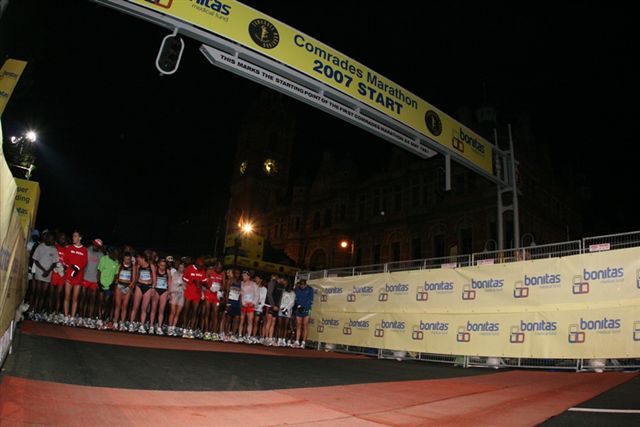 I developed a love of running when I was a teenager, years before I started to actually run. The running events were always my favourites in the Summer Olympics, and along with the rest of South Africa, I whooped and hollered and jumped up and down as Josia Thugwane won the marathon in the 1996 Olympics, mere months after being shot during a carjacking.
I developed a love of running when I was a teenager, years before I started to actually run. The running events were always my favourites in the Summer Olympics, and along with the rest of South Africa, I whooped and hollered and jumped up and down as Josia Thugwane won the marathon in the 1996 Olympics, mere months after being shot during a carjacking.
My Dad and I had a ritual that took place once a year, at the end of May. The ritual went something like this:
I am woken by Dad gently shaking my shoulder and placing a mug of coffee down on my nightstand. It is early in the morning – so early that it is still dark out. Despite the fact that I have the option to sleep – it is a statutory holiday – I choose instead to get up. Yawning and rubbing my eyes, I carry my coffee into the living room, where Dad is already sitting down and the TV is already on.
The TV screen is filled with thousands upon thousands of runners wearing race numbers, milling around at the starting line of South Africa’s greatest race. These runners have worked hard, trained hard to get here. They have a gruelling day ahead of them. The energy at the start line is so intense that it filters out of the TV and reaches me and Dad. We are literally sitting on the edges of our seats, all trace of sleepiness gone from both of us, as we make small talk about the runners.
“I don’t know if Fordyce has it in him to win this year,” says Dad.
I look at him, aghast. Bruce Fordyce always wins. The man is virtually a mascot for the race. How can he not win? Dad has a point, though. We keep seeing footage of him continually stretching out a calf muscle, as if it is troubling him.
All of a sudden, we hear the strains of Chariots of Fire coming from the TV. The runners, who only moments ago were a somewhat chaotic crowd, have arranged themselves into an organized pack. They are ready, they are focused, they have only one thing on their minds, and that is the finish line and how they will get there.
Chariots of Fire comes to an end, there is an excruciating pause, and then the gun goes off. And with that, South Africa’s greatest race – the Comrades Marathon – is underway.
The Comrades Marathon, a 90km event not for the faint of heart, has a long and illustrious history. It comes from noble beginnings: it was first organized by a World War I veteran to honour the memories of South African soldiers who had died during the war. A prime goal of the race, in addition to honouring the war dead, was (still is) to “celebrate mankind’s spirit over adversity”.
The course alternates every year – “up” runs start in Durban, “down” runs start in Pietermaritzburg. Runners have twelve hours to complete the race, and they have to reach predetermined points along the course within certain times in order to be eligible to continue.
Every year when the Comrades was on, Dad and I would park ourselves in front of the TV and watch the action unfold. Because contrary to what many might think, it’s not just a bunch of people running all day. There is a lot of drama and excitement that goes on. You see many, many aspects of the human spirit – both heartbreaking and uplifting.
Running is, in many ways, a metaphor for life. The Comrades Marathon especially so. The frontrunners in any race get a lot of coverage as spectators and TV viewers anxiously wait to see who will win. In this race, though, it’s not just elite athletes. Everyone is a star. Every runner is a hero – even the ones who have to suffer the heartbreak of not finishing the race.
When I finally started running at the age of 26, I knew that I wanted to be like a Comrades runner. Not in terms of form or distance or speed. It is highly unlikely that I will ever actually run the Comrades myself.
No, it was other characteristics of these athletes that I aspired to: the mental strength, the determination, the courage, the fortitude to reach out and help a struggling athlete, the sheer grit to keep going no matter what.
I wanted to be like a Comrades runner in terms of spirit.
And that is still what I strive for, not only in my running, but in my life.









